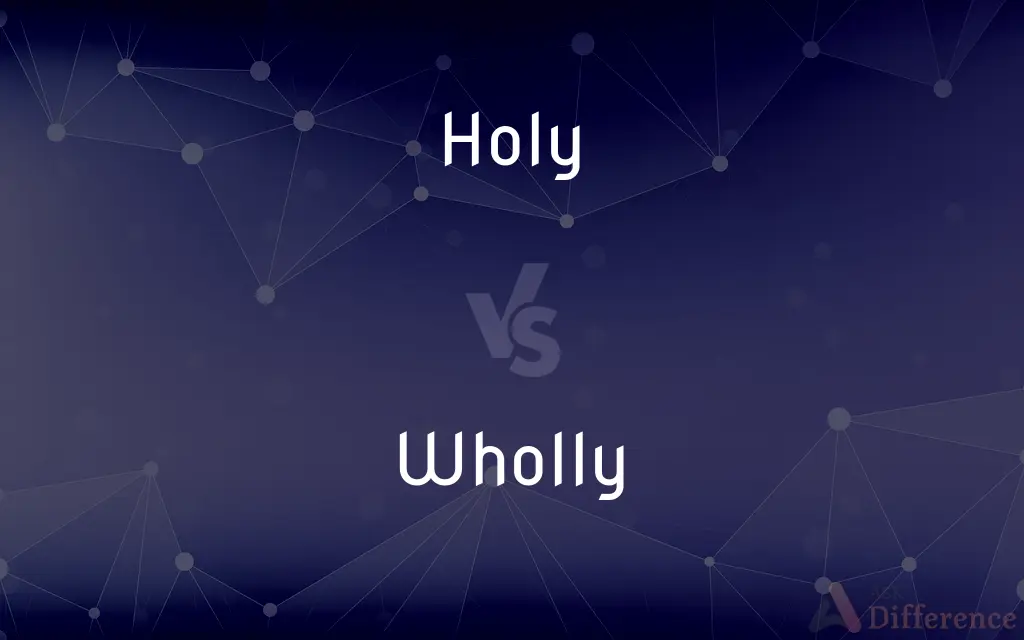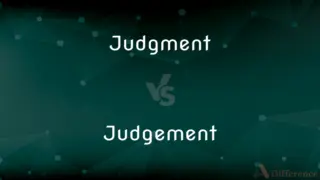Holy vs. Wholly — What's the Difference?
By Fiza Rafique & Maham Liaqat — Updated on April 3, 2024
Holy refers to sacredness and divine qualities, while wholly means entirely or completely.

Difference Between Holy and Wholly
Table of Contents
ADVERTISEMENT
Key Differences
Holy and wholly sound similar but have entirely different meanings. Holy is used to describe something that is sacred, divine, or spiritually pure. It conveys a sense of sanctity and is often associated with religious contexts, such as holy places, texts, or figures that are revered and worshipped. Wholly, on the other hand, is an adverb that means completely, fully, or to the total extent. It pertains to the idea of something being entire or complete, without any part excluded.
The concept of holiness is central to many religions and spiritual paths, underscoring the importance of certain sites, objects, and teachings that are considered divine or endowed with a special spiritual significance. Holy things are treated with reverence and respect, reflecting their perceived connection to the divine. Wholly, however, is used to describe the completeness or fullness of any situation, action, or quality, without implying any spiritual or divine characteristics.
In practical terms, something holy might be a place of worship or a sacred text that holds spiritual authority and guidance for believers. Such items or locations are often the focus of religious ceremonies and personal devotion, symbolizing the human connection to the divine or the sacred. Conversely, when something is described as being done wholly, it means that it has been done completely or to the full extent, such as in the phrase "wholly owned subsidiary," which means the parent company fully owns the subsidiary.
The distinction between holy and wholly also highlights the difference between qualitative and quantitative measures. Holiness refers to a qualitative, often subjective, attribute related to spiritual purity or divinity. Wholly, however, quantitatively measures the extent to which something is complete or entire, often used in secular contexts to indicate completeness or fullness in various aspects, including decision-making, ownership, or involvement.
While holy items or concepts are often protected, preserved, and passed down through generations within religious traditions, emphasizing their timeless and unchanging nature, the use of wholly is more flexible and can apply to a wide range of subjects, from business and legal matters to personal feelings and actions, indicating totality or completeness in a given context.
ADVERTISEMENT
Comparison Chart
Definition
Relating to the divine or sacred.
Entirely, completely, in total.
Context
Religious and spiritual.
General use, applicable in various contexts.
Connotation
Sacredness, divinity, spiritual purity.
Completeness, fullness, entirety.
Examples
Holy sites, holy scriptures, holy rituals.
Wholly owned, wholly committed, wholly absorbed.
Usage
Describes objects, places, or figures revered in religious contexts.
Describes the extent to which something is complete or total.
Compare with Definitions
Holy
Invoking sanctity:
The holy scriptures provide guidance to the faithful.
Wholly
Completely or entirely.
The project was wholly funded by donations.
Holy
Consecrated or hallowed.
Holy water is used in many religious ceremonies.
Wholly
Without exception.
The statement was wholly accurate.
Holy
Invoking sanctity.
The holy scriptures provide guidance to the faithful.
Wholly
Fully involved or engaged.
He was wholly absorbed in his work.
Holy
Sacred or divine.
The holy temple attracts thousands of pilgrims annually.
Wholly
In all respects.
The two designs were wholly different.
Holy
Religious significance.
The holy days are observed with fasting and prayer.
Wholly
To the full extent.
She was wholly devoted to her family.
Holy
Spiritually pure.
The holy man was revered by all in the village.
Wholly
Entirely; fully
The distinction is not wholly clear
She found herself given over wholly to sensation
Holy
Dedicated or consecrated to God or a religious purpose; sacred
The holy month of Ramadan
The Holy Bible
Wholly
Completely; entirely
"The old American purposes are still wholly relevant" (John F. Kennedy).
Holy
Used in exclamations of surprise or dismay
Holy smoke!
Wholly
Exclusively; solely.
Holy
Belonging to, derived from, or associated with a divine power; sacred.
Wholly
Completely and entirely; to the fullest extent.
Holy
Regarded with veneration or specified for a religious purpose
A holy book.
A holy place.
Wholly
Exclusively and solely.
A creature wholly given to brawls and wine.
Holy
Living or undertaken with highly moral or spiritual purpose; saintly
A holy person.
A holy way of life.
Wholly
In a whole or complete manner; entirely; completely; perfectly.
Nor wholly overcome, nor wholly yield.
Holy
Regarded as deserving special respect or reverence
The pursuit of peace is our holiest quest.
Wholly
To the exclusion of other things; totally; fully.
They employed themselves wholly in domestic life.
Holy
(Informal) Used as an intensive
Raised holy hell over the mischief their children did.
Wholly
To a complete degree or to the full or entire extent (`whole' is often used informally for `wholly');
He was wholly convinced
Entirely satisfied with the meal
It was completely different from what we expected
Was completely at fault
A totally new situation
The directions were all wrong
It was not altogether her fault
An altogether new approach
A whole new idea
Holy
Dedicated to a religious purpose or a god.
I'm planning to visit the holy city of Jerusalem this Christmas.
Holy
Revered in a religion.
To demonstrate that this is different from the following definition.
Holy
Morally perfect or flawless, or nearly so.
My grandmother is a very holy woman.
Holy
Separated or set apart from (something unto something or someone else).
Holy
Set apart or dedicated for a specific purpose, or for use by a single entity or person.
Holy
(slang) Used as an intensifier in various interjections.
Holy cow, I can’t believe he actually lost the race!
Those children next door are holy terrors!
Holy
(slang) An expression of astonishment and awe.
Holy
(archaic) A thing that is extremely holy; used almost exclusively in Holy of Holies.
Holy
Set apart to the service or worship of God; hallowed; sacred; reserved from profane or common use; holy vessels; a holy priesthood.
Holy
Spiritually whole or sound; of unimpaired innocence and virtue; free from sinful affections; pure in heart; godly; pious; irreproachable; guiltless; acceptable to God.
Now through her round of holy thoughtThe Church our annual steps has brought.
Holy
A sacred place of pilgrimage
Holy
Belonging to or derived from or associated with a divine power
Common Curiosities
How is holy used in religious contexts?
Holy is used to describe objects, places, or figures that are revered, sacred, or have divine attributes.
What does holy mean?
Holy refers to something that is sacred, divine, or spiritually significant.
Can the term wholly apply to emotions?
Yes, it can describe the extent of emotions, e.g., "He was wholly in love."
Can something be both holy and wholly?
Yes, in theory, something can be both sacred (holy) and complete or entire (wholly), but the contexts would differ.
What is an example of wholly in a sentence?
"She was wholly committed to her cause," meaning she was completely dedicated.
How does wholly differ from partially?
Wholly refers to something being complete or total, whereas partially means only to some extent, not fully.
What makes a place holy?
A place is considered holy if it is dedicated to religious purposes or regarded as sacred by believers.
What does wholly mean?
Wholly means completely, fully, or to the total extent.
Is holy always related to religion?
While primarily used in religious contexts, holy can also describe anything regarded with special respect or awe that invokes a sense of the sacred.
What is the significance of being holy?
Being holy signifies a special status that involves reverence, purity, and a connection to the divine.
Can businesses use the term wholly?
Yes, businesses often use it in terms like "wholly owned subsidiary," indicating complete ownership.
How does wholly affect the meaning of a statement?
It emphasizes totality or completeness, making the statement more absolute.
Does wholly imply anything about quality?
No, wholly refers to the extent or completeness of something, not its quality.
Is there a holy language?
Some religions designate certain languages as holy, used in scriptures and prayers, symbolizing their sacred status.
Can wholly be used in legal contexts?
Yes, it's used to describe completeness or totality in ownership, rights, or responsibilities.
Share Your Discovery

Previous Comparison
Judgment vs. Judgement
Next Comparison
Start vs. CommenceAuthor Spotlight
Written by
Fiza RafiqueFiza Rafique is a skilled content writer at AskDifference.com, where she meticulously refines and enhances written pieces. Drawing from her vast editorial expertise, Fiza ensures clarity, accuracy, and precision in every article. Passionate about language, she continually seeks to elevate the quality of content for readers worldwide.
Co-written by
Maham Liaqat













































